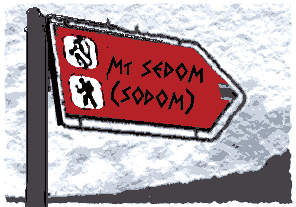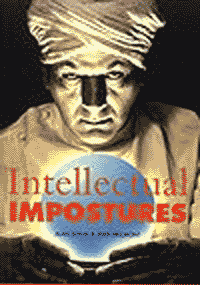SIGNPOSTS, 1
Knocking the Postmodern Citadel
 by Steve Booth
by Steve Booth
|
This short article about Postmodernism is part of a wider project provisionally titled 'Signposts'.
|
Think for a moment how a lie left unchallenged undermines all truth. When we study the wasteland, we know it is deficient. Postmodernism too, is a wasteland. One type of enquiry about po-mo asks what are its beliefs? Another approach looks at its consequences; intellectually, socially, economically, culturally, existentially, politically. In my Primitivism: An Illusion With No Future, I have already written at great length about the pseudo-radical political cult of Primitivism, and the way in which the Primitivists subordinate themselves to Postmodernism [1]. Alan Sokal, for example, understands po-mo in a political context, in terms of the neutralisation of the left [2].
 Five themes
Postmodernism has five main themes:
Five themes
Postmodernism has five main themes:
- The rejection of truth as a social construct, and the repudiation of reality in favour of the primacy of texts. 'All is text. There is nothing outside the text.' (Derrida, Kristeva, Barthes, Foucault) These are seen endlessly circulating, parasitic, incestuous, feeding off each other. The Simulacrum, Baudrillardian Hyperreality
- The denial of meaning, its replacement with a kaleidescope of transient impressions. We find ourselves in the middle of a carnival of fragmentation, flux, the instantaneously obsolete. The past, our sense of history, is wiped out. Who we were is trashed, bulldozered, or theme parked. Philosophy is brought down to product placement, advertising, a branch of capitalism
- The assault upon reason, through the assertion of arbitrariness, chaos. The Enlightenment is understood as a 'Project' which must be overturned or transcended. The status of science as a 'Metanarrative' (Lyotard) is questioned, deposed
- The wiping out of belief in the self (Heidegger, Lacan, Derrida) instead we find a schizophrenic disjunction of images. 'Anything goes', and with this all values are emptied. In accepting this, there is no one left to look. Instead language itself is alive, language thinks, and is active
- Postmodernists accept the dogma of relativism. (Moral relativism, epistemological relativism...) They refuse to make distinctions, draw boundaries, evaluate. Without better or worse, true or false, the whole of life is emptied, rendered void, valueless
Crisis
In addition to the above themes, there are a number of characteristic postmodernist approaches or methods. We find eclecticism, playfulness. Postmodernists often fall for the fallacy that to give an account of origins is to explain. Consonant with the doctrine of the primacy of the text, there is the Rumpelstiltskin fallacy that to name is to control. We find the error of the plenum. Following the Nietzschean theme, the death of the real "The 'real world' - an idea no longer of any use, not even a duty any longer - an idea grown useless, superfluous, consequently a refuted idea: Let us abolish it!" [3] we find the questioning of 'Metanarratives,' a 'Crisis of Representation'. Postmodernism cannot create, it can only rip-off images and rework them in this eclectic collage. We find the techniques of parody, pastiche and irony. Postmodernism is not so much a reaction to the sickness of society as the full blown disease itself.
Resistance is Futile
Because there is no truth, no objective reality, it doesn't matter what form your ironic, cynical pastiche of a protest movement takes on. All real resistance is futile - so the Postmodern liars will tell you. Postmodern beliefs are false, but to hold them brings consequences. We can understand from this that the prisoners are unwilling to leave their cages, even though they know that the doors are open.
- – Steve Booth

|
 by Steve Booth
by Steve Booth
 Five themes
Postmodernism has five main themes:
Five themes
Postmodernism has five main themes:

